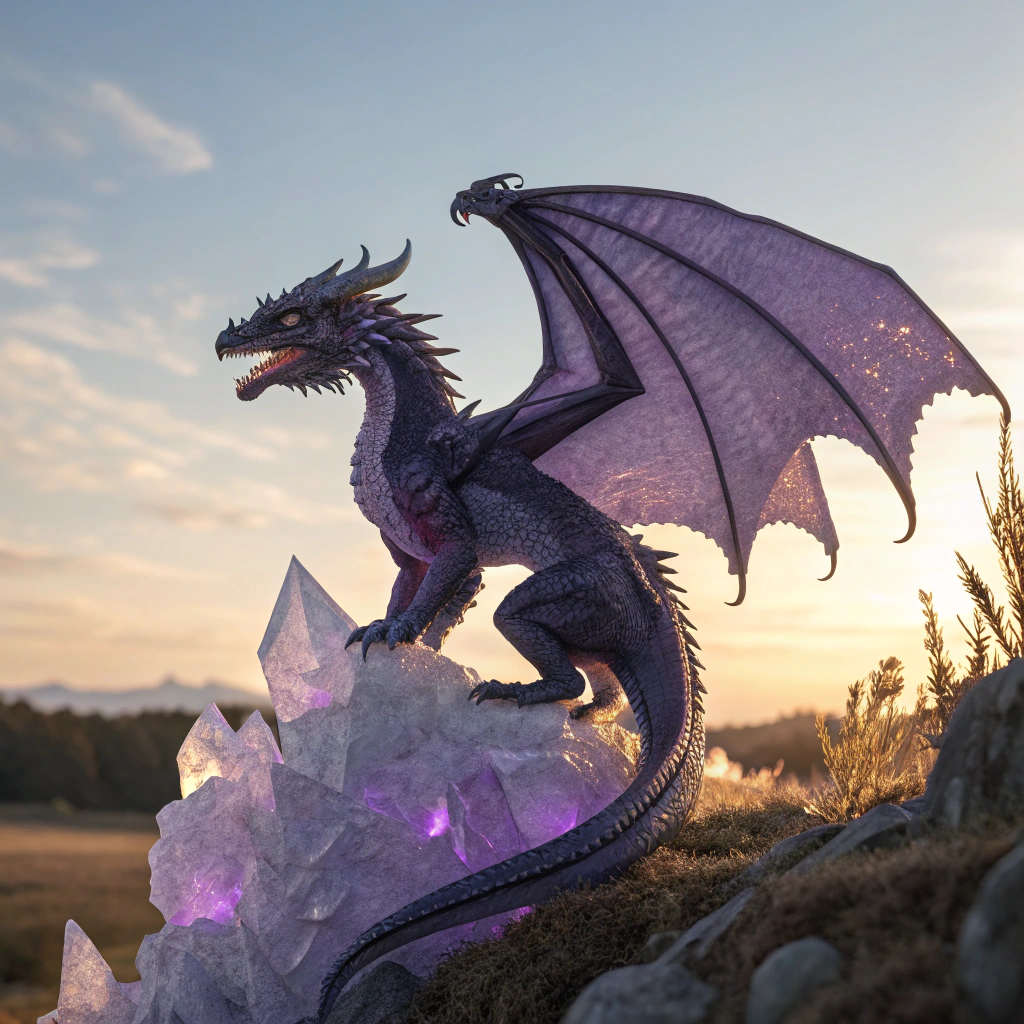
Amethyst Dragon Name Generator
Name: Tanzanox
Meaning Origin Description Fusion of Tanzania and Nox (night) Mixed A dragon whose scales shimmer like twilight through amethystName: Lavendra
Meaning Origin Description Derived from lavender Latin Graceful dragon with soft purple huesName: Xiameth
Meaning Origin Description Combination of Xia (grand) and amethyst Chinese/Greek Majestic purple-scaled ancient dragonName: Purpura
Meaning Origin Description Purple Latin Deep royal purple dragon with crystalline featuresName: Amystera
Meaning Origin Description Derived from amethyst Greek Mystical dragon with gem-like scalesAmethyst Dragon Details
| Habitat | Underground crystal caverns |
| Breath weapon | Line of force energy |
| Usual alignment | Lawful Neutral |
The Amethyst Dragon (Draconis crystallinus amethystus) is a remarkable gem dragon species characterized by its distinctive purple-hued scales, which exhibit varying degrees of translucency and possess properties similar to their namesake crystal. These creatures typically reach lengths of 60-80 feet at maturity, with wingspans approximately 1.5 times their body length.
Their natural habitat consists primarily of mountainous regions and deep underground caverns, particularly those rich in crystal formations and mineral deposits. They demonstrate a strong preference for territories containing amethyst geodes and quartz veins, which they incorporate into their lairs and utilize for both sustenance and magical enhancement.
The species exhibits exceptional psionic capabilities, with highly developed telepathic and telekinetic abilities. Their brain structure contains unique crystalline formations that appear to amplify their mental powers. Their diet consists primarily of minerals and crystals, with a particular affinity for quartz-family gemstones, though they will consume organic matter when necessary.
Behaviorally, Amethyst Dragons display remarkable intelligence and tend toward neutral good alignment, showing a strong predisposition for philosophical contemplation and intellectual pursuits. They are known to maintain extensive collections of knowledge and frequently engage in long periods of meditation. Their social structure is largely solitary, though they maintain complex networks of information exchange with other intelligent beings.
Physical attributes include:
- Crystalline scales with light-refracting properties
- Four pairs of horns arranged in a crown-like formation
- Retractable crystalline claws
- Enhanced night vision
- Natural resistance to psychic and magical effects
Notable behaviors include:
- Extended periods of philosophical contemplation
- Collection and categorization of knowledge
- Territorial defense through psionic means
- Strategic alliance-building with intellectually compatible species
- Mentorship of younger dragons and worthy non-dragon entities
Their reproduction cycle is particularly slow, with eggs requiring several decades to mature. Young Amethyst Dragons undergo a crystallization process during their early development, gradually acquiring their signature purple hue and psionic capabilities as they age.
Amethyst Dragons demonstrate remarkable longevity, with documented specimens surviving for multiple millennia. They show increased power and wisdom with age, developing more sophisticated psionic abilities and accumulating vast stores of knowledge throughout their extended lifespans.
Environmental impact assessment indicates they play a crucial role in maintaining magical equilibrium within their territories, often serving as guardians of significant ley line convergences and ancient knowledge repositories.
Research suggests these dragons possess a unique ability to manipulate crystalline structures at a molecular level, though the full extent and implications of this capability remain under study.
Special Note: Due to their rarity and intellectual disposition, Amethyst Dragons are considered highly valuable subjects for magical and psionic research, though their naturally cautious nature makes direct study challenging for most researchers.
Alignment Characteristics: Typically Neutral Good, demonstrating:
- Strong ethical principles
- Respect for knowledge and wisdom
- Balanced approach to law and chaos
- Protective instincts toward lesser beings
- Commitment to intellectual growth and understanding
These dragons represent one of the more contemplative and intellectually oriented species within the dragon taxonomy, making them particularly fascinating subjects for continued study and observation.